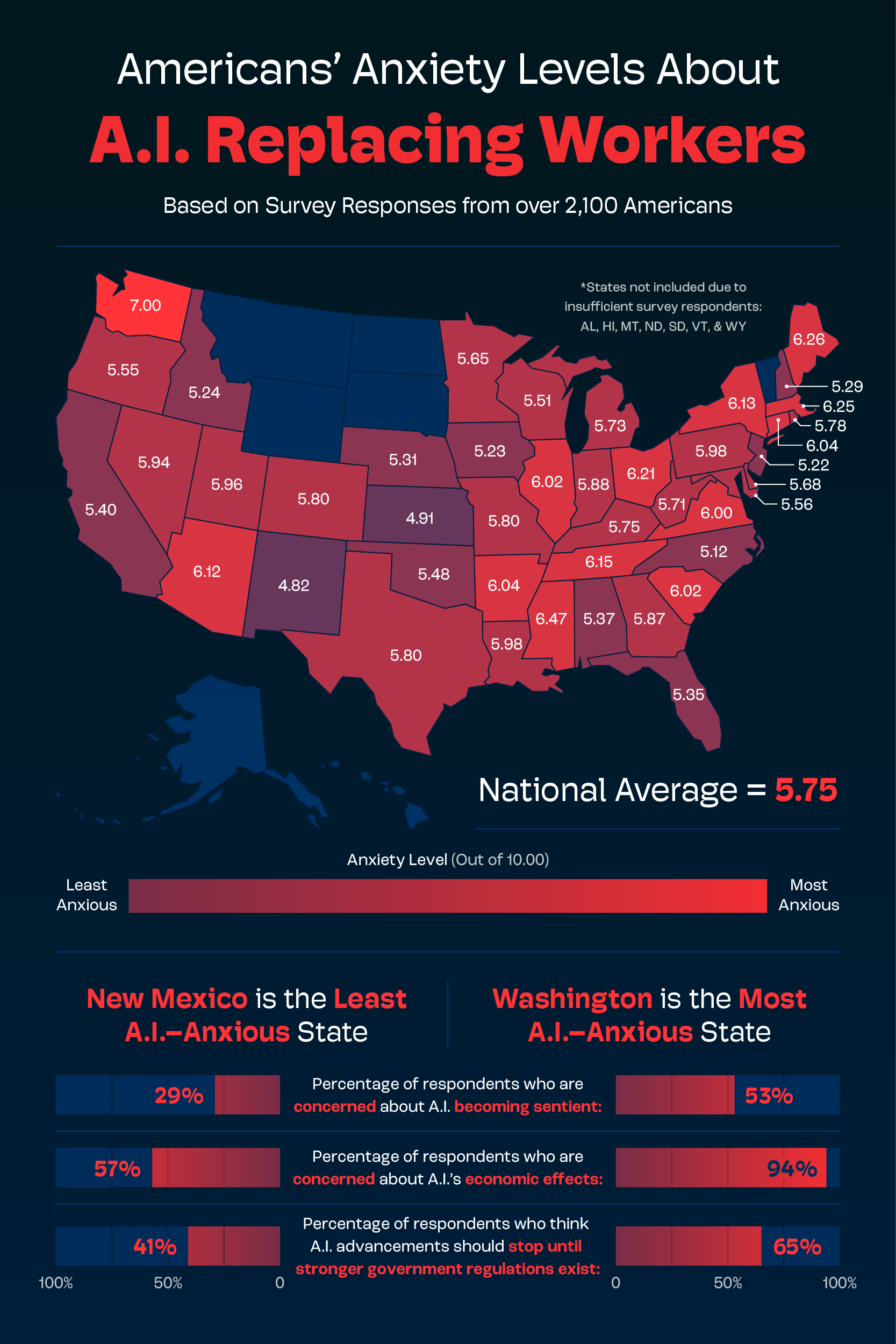Understanding America's AI Anxiety: A Deep Dive
Americans lead the world in AI anxiety, driven by concerns over creativity, relationships, job security, and regulation. Addressing these fears requires education and governance.

Understanding America's AI Anxiety: A Deep Dive
Americans currently exhibit the highest levels of concern globally about the rapid rise and integration of artificial intelligence (AI) into daily life. Recent surveys show that half of U.S. adults feel more anxious than excited about AI's growing influence, a sentiment that outpaces many other countries and highlights deep societal unease about the technology’s impact on creativity, relationships, jobs, and governance.
The Extent of AI Anxiety in America
Key Findings on Public Sentiment
- 50% of American adults say they are more concerned than excited about AI in their lives, a significant increase from 37% in 2021, indicating growing skepticism and wariness as AI adoption accelerates.
- 53% believe AI will worsen people’s ability to think creatively, while only 16% think it will improve creativity.
- Similarly, half of Americans think AI will negatively affect people’s capacity to form meaningful relationships.
- Despite concerns, a majority remain open to AI assisting with routine tasks and complex data analysis, such as weather forecasting (74%) and medical research, but resist AI involvement in personal or sensitive areas like mental health support (only 46% support).
Trust and Detection Challenges
- Americans overwhelmingly agree (76%) on the importance of being able to distinguish AI-generated content from human-created content, yet 53% doubt their own ability to detect AI-made images, videos, or texts, feeding into anxiety about misinformation and deepfakes.
Drivers Behind American AI Anxiety
Job Security and Economic Concerns
- AI-related job displacement is a major source of anxiety, especially among younger workers. Nearly 1 in 5 Gen Z workers (ages 18-34) express strong concern about losing their jobs to AI in the next two years, compared to about 10% of older generations.
- States with significant AI anxiety include tech and policy hubs like Washington D.C., California, Massachusetts, and New York, where AI development and regulation are prominent. Interestingly, Hawaii also ranks high in AI anxiety, likely due to economic vulnerabilities and cultural preservation fears.
- High-profile layoffs and restructuring announcements involving AI deployment from companies like Salesforce, Fiverr, and Microsoft have heightened fears about career stability, especially in industries undergoing rapid automation.
- Despite these concerns, some experts and reports, such as from Brookings Institution, caution that there is no immediate "AI jobs apocalypse," but stress the situation could evolve quickly depending on adoption and policy responses.
Governance and Regulation
- Americans' trust in government regulation of AI is mixed and cautious. According to Pew Research, 48% of people express low or no trust in the U.S. government to regulate AI effectively, a figure compounded by global skepticism toward major AI powers like China (60% distrust).
- Most Americans (55%) trust their own countries somewhat or a lot to regulate AI, with the European Union also receiving moderate trust (53%)—indicating a global desire for transparent, accountable AI oversight.
Societal Implications and Future Outlook
Creative and Social Impact
The broad American worry about AI's impact on creativity and relationships reflects a deeper cultural concern about human agency and connection in a world increasingly mediated by machines. Many fear that overreliance on AI could diminish essential human skills and social bonds.
Information Integrity and Misinformation
The prevalence of AI-generated content, including deepfakes and misinformation, has amplified fears about the loss of control over truth and authenticity, further intensifying public anxiety.
Opportunities and Reservations
While Americans are wary, there is cautious optimism for AI’s role in augmenting human capabilities in data-heavy fields and routine assistance. However, there remains strong resistance against AI making decisions in personal or ethical domains such as religion, matchmaking, or mental health care.
Visualizing AI Anxiety in America
Below are relevant images illustrating the topic:
- Graph from Pew Research Center showing the distribution of American attitudes toward AI, highlighting the majority concern over excitement.
- Infographic mapping U.S. states with highest AI anxiety, emphasizing tech hubs and unique cases like Hawaii.
- Portraits of young workers (Gen Z) expressing concerns about AI’s impact on employment, capturing the generational divide in AI anxiety.
Conclusion: Navigating AI Anxiety
The data clearly show that Americans lead the world in AI anxiety, driven by concerns over creativity, relationships, job security, trust in regulation, and information integrity. This anxiety is concentrated in regions closest to AI innovation but also prevalent in vulnerable economies like Hawaii. The generational divide, with younger workers most worried about job displacement, further complicates the national conversation.
Addressing these fears requires transparent governance, robust education on AI literacy, and workforce adaptation strategies. Balancing AI’s transformative benefits with public trust and ethical safeguards is critical to easing anxiety and fostering a constructive societal relationship with artificial intelligence.


